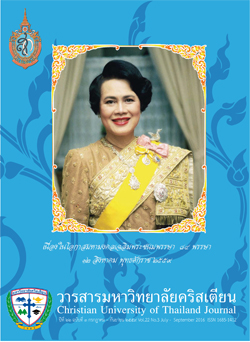การสนับสนุนความต้องการของผู้ดูแลที่เป็นญาติ
บทคัดย่อ
การดูแลเป็นกระบวนการที่ส่งเสริมให้บุคคลดำเนินชีวิตในสังคมได้อย่างปกติ การให้ความสนใจและห่วงใยผู้ที่ต้องพึ่งพาผู้อื่นจัดเป็นการดูแลแบบหนึ่ง ผู้ดูแลเป็นผู้ให้การสนับสนุนดูแลและดำเนินการในสิ่งที่จำเป็นและเป็นประโยชน์ต่อผู้อื่นเพื่อการดำรงชีวิต รวมทั้งเป็นบุคคลที่ทำหน้าที่ช่วยเหลือผู้ที่ไม่สามารถ ช่วยตนเองได้อย่างเต็มที่และอยู่ในภาวะพึ่งพา ประเด็นสำคัญเกี่ยวกับการดูแลโดยผู้ดูแลที่เป็นญาติซึ่งในบทความนี้เรียกว่า "ญาติผู้ดูแล" พบว่า 1) ญาติผู้ดูแลส่วนใหญ่เป็นเพศหญิงในวัยกลางคนและกำลังเข้าสู่วัยสูงอายุ 2) ความเครียด และการเผชิญความเครียดของญาติผู้ดูแลมีความสำคัญเกี่ยวข้องกับการดูแลผู้ป่วยหรือผู้ที่ต้องพึ่งพา 3)ภาระการดูแลผู้ป่วยและคุณภาพชีวิตของญาติผู้ดูแลมีความสัมพันธ์เชิงแปรผกผัน และ 4) ความต้องการของผู้ดูแลเป็นสิ่งสำคัญ
ดังนั้น การสนับสนุนความต้องการเกี่ยวกับการดูแล ในผู้ดูแลที่เป็นญาติของผู้ป่วยจึงควรประกอบด้วย ด้านร่างกาย ด้านอารมณ์ ด้านข้อมูลข่าวสาร ด้านจิตสังคม ด้านจิตวิญญาณ และด้านการปฏิบัติ พยาบาลต้องให้ความสำคัญกับความต้องการของญาติผู้ดูแลผู้ป่วยหรือผู้ที่ต้องพึ่งพา อาทิ ผู้สูงอายุ เพื่อให้ผู้ดูแลเหล่านั้นมีการดำเนินชีวิตของตนเองไปพร้อมกับการดูแลผู้ป่วย ที่เรียกว่าเป็นการ "ใช้ชีวิตที่ได้ดูแลผู้ป่วยที่เป็นสมาชิกในครอบครัว" (Living care) แทนที่การเป็น "ผู้ให้การดูแล" (Giving care) โดยไม่ได้อยู่อย่างการใช้ชีวิตร่วมกันในครอบครัว
เอกสารอ้างอิง
กุลประภัสสร์ คังคะประดิษฐ์ ศากุล ช่างไม้ และสมพันธ์ หิญชีระนันทน์. (2557). อิทธิพลของภาระหนักในการดูแลต่อคุณภาพชีวิตของผู้ดูแลผู้ป่วยโรคหลอดเลือดสมอง. รายงานวิจัยนำเสนอในการประชุม วิชาการระดับชาติและนำเสนอผลงานวิจัย "วิทยาศาสตร์ เทคโนโลยีและนวัตกรรม เพื่อการพัฒนาที่ยั่งยืน" จัดโดยศูนย์วิจัย ร่วมกับบัณฑิตวิทยาลัย มหาวิทยาลัยคริสเตียน. เมื่อวันที่ 15 พฤษภาคม พ.ศ. 2557.
จิราพร เพิ่มเยาว์. (2547). ความต้องการด้านจิตวิญญาณของผู้ดูแลผู้ที่เป็นโรคจิตเภท. วิทยานิพนธ์ปริญญาพยาบาลศาสตรมหาบัณฑิต สาขาวิชาสุขภาพจิตและการพยาบาลจิตเวช. บัณฑิตวิทยาลัย มหาวิทยาลัยเชียงใหม่.
ชนัญชิดาดุษฎี ทูลศิริ, รัชนี สรรเสริญ, และ วรรณรัตน์ ลาวัง. (2554). "การพัฒนาแบบวัดภาระในการดูแลของผู้ดูแลผู้ป่วยเรื้อรัง". การพยาบาลและการศึกษา. 4(1) : 62-75.
ยุพาพิน ศิรโพธิ์งาม. (2546). "การสำรวจงานวิจัยเกี่ยวกับญาติผู้ดูแลผู้ป่วยเรื้อรังในประเทศไทย". รามาธิบดีพยาบาลสาร. 9(2) : 156-165.
ยุพาพิน ศิรโพธิ์งาม พรรณวดี พุธวัฒนะ และสมฤดี สิทธิมงคล. (2542). "ความต้องการในการดูแลของผู้สูงอายุ ความเครียด และการเผชิญความเครียดของญาติผู้ดูแลผู้สูงอายุ". วารสารวิจัยทางการพยาบาล, 3(3): 251-268.
รสศุคณธ์ เจืออุปถัมธ์. (2553). ความต้องการของญาติผู้ดูแลผู้ป่วยโรคหลอดเลือดสมองที่บ้าน. วิทยานิพนธ์หลักสูตรพยาบาลศาสตรมหาบัณฑิต สาขาการพยาบาลเวชปฏิบัติชุมชน. บัณฑิตวิทยาลัย มหาวิทยาลัยคริสเตียน.
โรชินี อุปรา, ชลธิชา เรือนคำ, เจนนารา วงศ์ปาลี, และเอกชัย กันธะวงศ์. (2554). "ประสบการณ์ของผู้ให้การดูแลผู้ป่วยโรคหลอดเลือดสมองที่บ้าน". Rajabhat Journal of Sciences, Humanities & Social Sciences. 12(2): 50-59. สืบค้นจาก https://journal.psru.ac.th/ebook/v12no2_4.pdf เมื่อ 12 มกราคม 2559.
ศิริวรรณ ศิริบุญ. (2545). ในสุทธิชัย จิตะพันธ์กุล นภาพร ชโยวรรณ และศศิพัฒน์ ยอดเพชร (บรรณาธิการ) ผู้สูงอายุในประเทศไทย รายงานการทบทวนองค์ความรู้และสถานการณ์ปัจจุบันตลอดจนข้อเสนอแนะทางนโยบายและการวิจัย. กรุงเทพฯ: โรงพิมพ์แห่งจุฬาลงกรณ์มหาวิทยาลัย.
ศศิพัฒน์ ยอดเพชร. (2547). ผู้ดูแลผู้สูงอายุ: การสังเคราะห์องค์ความรู้. กรุงเทพฯ: โรงพิมพ์มหาวิทยาลัยธรรมศาสตร์.
อรอนงค์ กูลณรงค์, เพลินพิศ ฐานิวัฒนานนท์, และ ลัพณา กิจรุ่งโรจน์. (2555). "ความพร้อมในการดูแลสัมพันธภาพในครอบครัว และความเครียดในบทบาทผู้ดูแลผู้ป่วยมุสลิมโรคหลอด เลือดสมอง". วารสารมหาวิทยาลัยนราธิวาสราชนครินทร์. 4(1) : 14-27.
Cannuscio, C.C., Jones, C., Kawachi, I., Colditz, G.A., Berkman, L. & Rimm, E.(2002). "Reverberations of family illness: A longitudinal assessment of informal caregiving and mental health status in the nurses' health study". American Journal of Public Health. 92(8); 1311.[online]. Retrieved January 23 , 2016, from https://www.ncbi.nlm.nih.gov/pmc/articles/PMC1447235/pdf/0921305.pdf .
Changmai, S., Hinjiranan, S., Pengkaew, R., Thanakumma, O., & Weerasathian, I. (2013). "Caring Phase for Stroke Patients Provided by Family Caregivers". International journal of nursing and health science. 1(1): 29-43.
Chow, S.K.Y., Wong, F.K.Y., & Poon, C.Y.F. (2007). "Coping and caring: Support for family caregivers of stroke survivors". Journal of Nursing and Health Care and Chronic Illness in association with Journal of Clinical Nursing, 16(7b):133-143, doi: 10.1111/j.1365-2702.2006.01711.x.
Coombs, U.E. (2007). "Spousal caregiving for stroke survivors". Journal of Neuroscience Nursing. 39(2): 112-119.
Fitch, M.I. (2008). "Supportive care framework". [online]. Retrieved January 12, 2013, from Canadian Oncology Nursing Journal. doi:10.5737/1181912x181614.
Garrett, D., & Cowdell, F. (2005). "Information needs of patients and carers following stroke". Nursing Older People. 17(6) : 14-16.
Gorji, M.A.H., Bouzar, Z., Haghshenas, M., Kasaeeyan, A.A., Sadeghi, M.R., & Ardebil, M.D. (2012). "Quality of life and depression in caregivers of patients with breast cancer". BMC Research Notes, 5:310. [online]. Retrieved January 12, 2016, from www.biomedicentrl.com/1756-0500/5/310.
Grant, J.S., Elliot, T.R., Giger, J.N. & Bartolucci, A.A. (2001). "Social problem solving telephone partnerships with family caregivers of persons with stroke". International Journal of Rehabilitation Research. 24(3): 181-189. .
Grant, J.S., Weaver, M., Elliott, T.R., Bartolucci, A.R., & Giger, J.N. (2004). "Sociodemographic, physical and psychosocial factors associated with depressive behaviour in family caregivers of stroke survivors in the acute care phase". Brain Injury.18(8) : 797-809.
Horowitz, A. (1985). Family caregiving to the frail elderly. In Lawton, M.P. & Maddox, G. L. (Eds.), Annual Review of Gerontology and Geriatrics, 5: 194-246. New York: Springer.29(2) : 111-121.
Jullamate, P., Azeredo, Z., Paul, C. & Subgranon, R. (2006). "Thai stroke patient caregivers: who they are and what they need". [online]. Retrieved March 28, 2012, from Cerebrovascular Diseases, 21; 128-133. doi: 10.1159/000090211.
Kerr, S.M., & Smith, L.N. (2001). "Stroke: an exploration of the experience of informal caregiving". Clinical Rehabilitation. 15(4): 428-436.
Macisaac, L., Harrison, M.B., & Godfrey, C. (2010). "Supportive care needs of caregivers of individuals following stroke: A synopsis of research". Canadian Journal of Neuroscience Nursing. 32(1): 39-46.
Mackenzie, A., Perry, L., Lockhart, E., Cottee, M., Cloud, G. & Mann, H. (2007). "Family carers of stroke survivors: needs, knowledge, satisfaction and competence in caring". Disability & Rehabilitation. 29(2) : 111-121.
Mak, A.K.M., Mackenzie, A., & Lui, M.H.L. (2007). "Changing needs of Chinese family caregivers of stroke Survivors". Journal of Clinical Nursing. 16(5): 971-979.
Meecharoen, W., Northhouse, L., Sirapo-ngam, Y., & Monkong, S. (2013) "Family caregivers for cancer patients in Thailand: An integrative review". SAGE Open, 3,1-10. Retrieved January 12, 2016 , from https://sgo.sagepub.com/content/3/3/2158244013500280.full.pdf+html.
Montgomery, R., Gonyea, J., & Hooyman, N. (1985). "Caregiving and the Experience of Subjective and Objective Burden". Family Relations, 34(1), 19-26. doi:1. Retrieved January 12, 2016, from https://www.jstor.org/stable/583753 doi:1 National Cancer Institute. (2014). Caring for the caregiver. NIH Publication No. 14-6219, September 2014.
O'Connell, B., Baker, L., & Prosser, A. (2003). "The educational needs of caregivers of stroke survivors in acute and community settings". Journal of Neuroscience Nursing. 35(1): 21-28.
Orem, D.E., Taylor, S.G. & Renpenning, K.M. (2001). Nursing concepts of practice. 6edition, St. Louis: Mosby, Inc.
Ski, C., & O'Connell, B. (2007). "Stroke: The increasing complexity of carer needs". Journal of Neuroscience Nursing. 39(3) : 172-179.
Smith, J., Forster, A., & Young, J. (2004). "A randomized trial to evaluate an education programme for patients and carers after stroke". Clinical Rehabilitation. 18(7) : 726-736.
White, C. L., Korner-Bitensky, N., Rodrigue, N., Rosmus, C., Sourial, R., Lambert, S., & Wood-Dauphinee, S. (2007). "Barriers and facilitators to caring for individuals with stroke in the community: the family Experience". Canadian Journal of Neuroscience Nursing. 29(2): 5-12.
Wong, D.F.K., Lam, A.Y.K., Chan, S.K. & Chan, S.F. (2012). "Quality of life of caregivers with relatives suffering from mental illness in Hong Kong: roles of caregiver characteristics, caregiving burdens, and satisfaction with psychiatric services". Health and Quality of Life Outcomes. 10(15): 1-9. [online]. Retrieved January 10, 2016 from www.hqlo.com/content/10/1/15 .
Zarit, S.H., Todd, P.A. & Zarit, J.H. (1986). "Subjective burden of husbands and wives as caregivers: A longtitudinal study". Gerontologist. (26) : 260-266.



